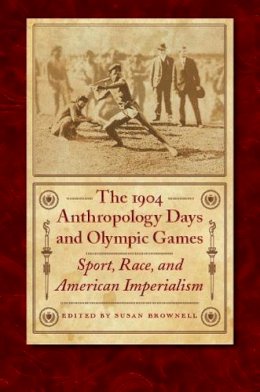
Stock image for illustration purposes only - book cover, edition or condition may vary.
The 1904 Anthropology Days and Olympic Games. Sport, Race, and American Imperialism.
Susan . Ed(S): Brownell
€ 62.23
FREE Delivery in Ireland
Description for The 1904 Anthropology Days and Olympic Games. Sport, Race, and American Imperialism.
hardcover. An interdisciplinary collection of essays that assesses the ideas about race, imperialism, and Western civilization manifested in the 1904 World's Fair and Olympic Games and shows how they are still relevant. Editor(s): Brownell, Susan. Series: Critical Studies in the History of Anthropology. Num Pages: 490 pages, 27 photographs, 1 figure, 1 map, 2 tables. BIC Classification: 1KBB; 3JJC; JHMC. Category: (UP) Postgraduate, Research & Scholarly. Dimension: 5817 x 3887 x 43. Weight in Grams: 876.
One of the more problematic sport spectacles in American history took place at the 1904 World’s Fair in St. Louis, which included the third modern Olympic Games. Associated with the Games was a curious event known as Anthropology Days organized by William J. McGee and James Sullivan, at that time the leading figures in American anthropology and sports, respectively. McGee recruited Natives who were participating in the fair’s ethnic displays to compete in sports events, with the “scientific” goal of measuring the physical prowess of “savages” as compared with “civilized men.” This interdisciplinary collection of essays assesses the ideas about race, imperialism, and Western civilization manifested in the 1904 World’s Fair and Olympic Games and shows how they are still relevant.
A turning point in both the history of the Olympics and the development of modern anthropology, these games expressed the conflict between the Old World emphasis on culture and New World emphasis on utilitarianism. Marked by Franz Boas’s paper at the Scientific Congress, the events in St. Louis witnessed the beginning of the shift in anthropological research from nineteenth-century evolutionary racial models to the cultural relativist paradigm that is now a cornerstone of modern American anthropology. Racist pseudoscience nonetheless reappears to this day in the realm of sports.
A turning point in both the history of the Olympics and the development of modern anthropology, these games expressed the conflict between the Old World emphasis on culture and New World emphasis on utilitarianism. Marked by Franz Boas’s paper at the Scientific Congress, the events in St. Louis witnessed the beginning of the shift in anthropological research from nineteenth-century evolutionary racial models to the cultural relativist paradigm that is now a cornerstone of modern American anthropology. Racist pseudoscience nonetheless reappears to this day in the realm of sports.
Product Details
Format
Hardback
Publication date
2008
Publisher
University of Nebraska Press United States
Number of pages
490
Condition
New
Series
Critical Studies in the History of Anthropology
Number of Pages
490
Place of Publication
Lincoln, United States
ISBN
9780803210981
SKU
V9780803210981
Shipping Time
Usually ships in 7 to 11 working days
Ref
99-1
About Susan . Ed(S): Brownell
Susan Brownell is a professor and chair of the Department of Anthropology at the University of Missouri, St. Louis. She is the author of Training the Body for China: Sports in the Moral Order of the People’s Republic and Beijing’s Games: What the Olympics Mean to China. Contributors: John Bale, Susan Brownell, Mark Dyreson, Henning Eichberg, Gerald R. Gems, Alexander Kitroeff, Suzuko Mousel Knott, Jonathan Marks, Christine M. O’Bonsawin, Nancy J. Parezo, Linda Peavy, Otto J. Schantz, and Ursula Smith.
Reviews for The 1904 Anthropology Days and Olympic Games. Sport, Race, and American Imperialism.
"In this edited volume, sports anthropologist Brownell leads an exploration of a forgotten moment in premodern anthropology. . . . A very successful project of intellectual history."—J. Marks, CHOICE "The multidisciplinary approach offered by this collection succeeds in exposing the relationships between anthropology, physical culture, the Olympic movement, and imperialism in revelatory ways."—John W. Troutman, Western Historical Quarterly "The authors provide not only a window into the history of a sporting event but also an important story about sports as a system of representation. This volume is a fine collection that recalls a past event that is still relevant to the present."—John Bloom, American Historical Review "Through their analyses of the 1904 Games, the authors convincingly interrogate—and connect—categories of science, sport, race, and nation at the turn of the 20th century. . . . The book will appeal to a number of audiences, including scholars interested in the histories of anthropology, museums as well as world's fairs and other forms of display, science, sport, colonialism, imperialism, and national and international movements."—Andi Johnson, Museum Anthropology Review "This is a well-conceived volume that will be of wide interest to many scholars."—Barbara Keys, Journal of American Ethnic History "The connection between the histories of the Olympics and anthropology provides a unique perspective on the history of sport. . . . The 1904 Anthropology Days and Olympic Games would make an excellent addition to the library of any scholar interested in the history of the Olympics or the history of anthropology."—Colleen English, International Journal of the History of Sports
